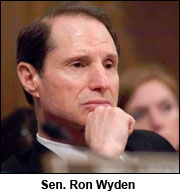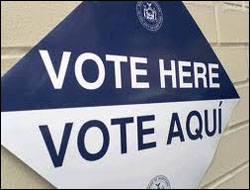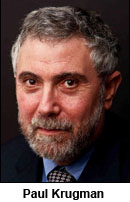NEWS ROUNDUP
RTW nonsense, shrewd ILWU, knowledge isn’t power…
Thursday, March 5, 2015
‘RIGHT TO WORK’
► In today’s (Vancouver) Columbian — Right to Work = Freedom (editorial) — With limits on hours worked and strict safety regulations and minimum-wage rules, government over the past century has somewhat eliminated the need for organized labor… Even with the middle class devolving, and even with the need for changes in our economic structure to rebuild that middle class and ensure continued prosperity, it is difficult to develop a cogent argument against right-to-work laws.
 EDITOR’S NOTE — How about this? “Freedom” doesn’t mean free. Why should unions be forced to negotiate, maintain and enforce contracts for employees who are free-riders? And why should the government interfere in the collective bargaining process by banning workers from choosing — and employers from agreeing to — union-security clauses? We thought conservatives and libertarians were against heavy-handed government intervention. Apparently, that’s not the case when it serves their Ayn Rand ideology or their political interests. That’s right. Any serious observer of the openly partisan push for so-called “right-to-work” understands that Republican Party politics is driving these campaigns in order to defund traditional allies of the Democratic Party. To deny this is either willfully ignorant or openly disingenuous.
EDITOR’S NOTE — How about this? “Freedom” doesn’t mean free. Why should unions be forced to negotiate, maintain and enforce contracts for employees who are free-riders? And why should the government interfere in the collective bargaining process by banning workers from choosing — and employers from agreeing to — union-security clauses? We thought conservatives and libertarians were against heavy-handed government intervention. Apparently, that’s not the case when it serves their Ayn Rand ideology or their political interests. That’s right. Any serious observer of the openly partisan push for so-called “right-to-work” understands that Republican Party politics is driving these campaigns in order to defund traditional allies of the Democratic Party. To deny this is either willfully ignorant or openly disingenuous.
So why, dear Columbian… why must you maintain the pretense that this is about “freeing” workers from unions? It couldn’t be more obvious that the people behind these “right-to-work” campaigns are also fighting to dismantle all of the labor standards unions fought to establish — the same standards cited in this editorial as reasons why unions are no longer needed.
Now, we get back to our daily evidence that unions are needed now more than ever…
LOCAL
 ► In today’s Seattle Times — Dockworker union protected pay, clout as trade grew — Wages for most blue-collar workers along the chain have fallen with the quick rise of global trade. But the longshore workers who move the goods the shortest distance, between ship and shore, have shrewdly protected pay that trumps that of many white-collar managers. Organizing all West Coast ports in the 1930s under a single contract prevents shipping companies from pitting workers at neighboring ports against one another.
► In today’s Seattle Times — Dockworker union protected pay, clout as trade grew — Wages for most blue-collar workers along the chain have fallen with the quick rise of global trade. But the longshore workers who move the goods the shortest distance, between ship and shore, have shrewdly protected pay that trumps that of many white-collar managers. Organizing all West Coast ports in the 1930s under a single contract prevents shipping companies from pitting workers at neighboring ports against one another.
► In today’s Seattle Times — Labor board orders vote count in Seattle U. union election — The local office of a national labor board has ordered that votes be counted in a stalled election to decide whether adjunct faculty at Seattle University should form a union. The school has until March 17 to appeal the decision.
ALSO at The Stand — NLRB orders Seattle University: Count the adjuncts’ ballots!
 ► In the NW Labor Press — A union office like something out of Portlandia — Keen-eyed local unionists might have noticed something familiar about a location in a recent episode of the comedy show Portlandia: It’s the regional satellite office of the Pacific Northwest Regional Council of Carpenters. Of course, that wasn’t obvious: In the show, the union sign on the front of the building was digitally replaced with “Make-A-Wish” for a skit about a very immature man (played by Fred Armisen) diagnosed with cancer.
► In the NW Labor Press — A union office like something out of Portlandia — Keen-eyed local unionists might have noticed something familiar about a location in a recent episode of the comedy show Portlandia: It’s the regional satellite office of the Pacific Northwest Regional Council of Carpenters. Of course, that wasn’t obvious: In the show, the union sign on the front of the building was digitally replaced with “Make-A-Wish” for a skit about a very immature man (played by Fred Armisen) diagnosed with cancer.
STATE GOVERNMENT
► In today’s Olympian — Senate joins table on transportation (editorial) — All in all, the Senate action is progress, and it sets the table for serious negotiation with the House and the Governor’s Office, and, we hope, an agreement to fund transportation and reduce carbon pollution in our state.
 ► In today’s News Tribune — A transportation breakthrough in the state Senate (editorial) — The vote was an impressive demonstration of Republican pragmatism. The party’s anti-tax hard-liners had seemed the chief obstacle to any major improvement to the state’s transportation system… It’s reasonable to raise the question of how new carbon fuel rules would affect consumers — that’s a matter of transparency in government. But the standards are a distinct issue that ought to be debated and decided on its own merits. Using a critical statewide transportation package to kill the idea seems roughly the equivalent of trying to undo President Obama’s immigration policy by defunding the nation’s homeland security budget.
► In today’s News Tribune — A transportation breakthrough in the state Senate (editorial) — The vote was an impressive demonstration of Republican pragmatism. The party’s anti-tax hard-liners had seemed the chief obstacle to any major improvement to the state’s transportation system… It’s reasonable to raise the question of how new carbon fuel rules would affect consumers — that’s a matter of transparency in government. But the standards are a distinct issue that ought to be debated and decided on its own merits. Using a critical statewide transportation package to kill the idea seems roughly the equivalent of trying to undo President Obama’s immigration policy by defunding the nation’s homeland security budget.
ALSO at The Stand — Fix fatal flaws in transportation package (by Sen. Pramila Jayapal)
PLUS — WSLC: Lose poison pills, pass ‘clean’ transportation package
► In today’s Spokesman-Review — State gas tax can’t finance work needed for highways (editorial) — State Treasurer Jim McIntire advises legislators to bring the portion of revenues dedicated to repaying bonds down to 50-50 with the proposed 11.7 cent gas tax increase the transportation bill would roll out over three years.
► In the Columbia Basin Herald — $12 minimum wage bill passes House — Rep. Joe Schmick (R-Colfax) said this would especially be a problem in the agriculture community where it’s difficult to pass the cost along to consumers. “I know farmers who are cheap, that’s just the way it is,” Schmick said.
► In today’s Seattle Times — Should young hockey players be exempt from labor law? — Bills in Olympia would exempt the Western Hockey League and its young players from labor laws that the league is under investigation for violating.
► In today’s News Tribune — House votes to retake tuition-setting power — The Washington House of Representatives has voted to revoke tuition-setting power it previously gave to the state’s universities.
► In today’s Columbian — Sen. Rivers confirms she is out of county race — Confirming what sources said earlier in the week, Republican state Sen. Ann Rivers confirmed today she won’t run for chair of the Clark County council.
FEDERAL GOVERNMENT
 ► In today’s NY Times — Fate of Obama’s trade agenda may rest with one Oregon senator — Obama’s ambitious trade agenda — once seen as the best chance for bipartisan accomplishment in an otherwise rived Congress — appears to rest on the narrow, somewhat wobbly shoulders of Sen. Ron Wyden (D-Ore.), a position acknowledged by both parties and the White House with some trepidation… From his position in the driver’s seat, Wyden is putting demands on the fast-track bill that Republicans are not sure they can accept — most important, a shut-off valve that Congress could turn if the details of the Pacific or European accords did not live up to their promise.
► In today’s NY Times — Fate of Obama’s trade agenda may rest with one Oregon senator — Obama’s ambitious trade agenda — once seen as the best chance for bipartisan accomplishment in an otherwise rived Congress — appears to rest on the narrow, somewhat wobbly shoulders of Sen. Ron Wyden (D-Ore.), a position acknowledged by both parties and the White House with some trepidation… From his position in the driver’s seat, Wyden is putting demands on the fast-track bill that Republicans are not sure they can accept — most important, a shut-off valve that Congress could turn if the details of the Pacific or European accords did not live up to their promise.
EDITOR’S NOTE — Accountability for promises?! What is he, some kind of radical?
► From The Hill — Moderate Dems unveil economic plan — The New Democrat Coalition, a caucus of moderate House Democrats, unveiled its economic proposal — the first of its kind in its nearly 18-year history. The two-page proposal calls for fixing the tax code and increasing infrastructure spending. And while it doesn’t specifically mention the trade agreements being pursued by the White House, it does include a call to “aggressively pursue expanding export opportunities so we can make it here and sell it everywhere.”
EDITOR’S NOTE — All but one of Washington’s Democratic Congressional delegation are members of this coalition. Its 46 members include Reps. Suzan DelBene, Denny Heck, Derek Kilmer, Rick Larsen, and Adam Smith. Only Rep. Jim McDermott is not a member.
SUPREME COURT
 ► From The Hill — Few clues from Roberts on fate of ObamaCare at Supreme Court — The Supreme Court appeared deeply divided Wednesday on whether to curtail subsidies under ObamaCare, with Chief Justice John Roberts and Justice Anthony Kennedy providing few clues about where they might fall. Roberts, who cast the decisive vote in favor of ObamaCare in 2012, was unusually quiet during the oral arguments, prompting CNN analyst Jeffrey Toobin to declare the chief justice’s views of the case “almost entirely a mystery.”
► From The Hill — Few clues from Roberts on fate of ObamaCare at Supreme Court — The Supreme Court appeared deeply divided Wednesday on whether to curtail subsidies under ObamaCare, with Chief Justice John Roberts and Justice Anthony Kennedy providing few clues about where they might fall. Roberts, who cast the decisive vote in favor of ObamaCare in 2012, was unusually quiet during the oral arguments, prompting CNN analyst Jeffrey Toobin to declare the chief justice’s views of the case “almost entirely a mystery.”
NATIONAL
 ► At Think Progress — Cities are quietly reviving Jim Crow-era tactic to suppress Latino votes — As the Latino population grows across the country, cities have employed at-large voting to dilute the Latino vote and maintain white control of local governing bodies. Recently, a court in Washington struck down the city of Yakima’s at-large voting system. “A lawsuit like [Yakima] will clearly have a very important impact,” said Laughlin McDonald, director of the ACLU’s Voting Rights Project. “This was the first Section 2 challenge to an at-large system that was brought in Washington state and already the Hispanic population in Pasco, Washington, has approached the city council there and asked them to adopt a single member district plan to replace the at-large system.” Kathleen Taylor, the executive director of Washington’s ACLU branch, said the city of Pasco is likely to change its system before it is sued and ends up in a similar position to Yakima.
► At Think Progress — Cities are quietly reviving Jim Crow-era tactic to suppress Latino votes — As the Latino population grows across the country, cities have employed at-large voting to dilute the Latino vote and maintain white control of local governing bodies. Recently, a court in Washington struck down the city of Yakima’s at-large voting system. “A lawsuit like [Yakima] will clearly have a very important impact,” said Laughlin McDonald, director of the ACLU’s Voting Rights Project. “This was the first Section 2 challenge to an at-large system that was brought in Washington state and already the Hispanic population in Pasco, Washington, has approached the city council there and asked them to adopt a single member district plan to replace the at-large system.” Kathleen Taylor, the executive director of Washington’s ACLU branch, said the city of Pasco is likely to change its system before it is sued and ends up in a similar position to Yakima.
TODAY’S MUST-READ
 ► In today’s NY Times — Knowledge isn’t power (by Paul Krugman) — Soaring inequality isn’t about education; it’s about power… There’s a lot we could do to redress this inequality of power. We could levy higher taxes on corporations and the wealthy, and invest the proceeds in programs that help working families. We could raise the minimum wage and make it easier for workers to organize. It’s not hard to imagine a truly serious effort to make America less unequal. But given the determination of one major party to move policy in exactly the opposite direction, advocating such an effort makes you sound partisan. Hence the desire to see the whole thing as an education problem instead. But we should recognize that popular evasion for what it is: a deeply unserious fantasy.
► In today’s NY Times — Knowledge isn’t power (by Paul Krugman) — Soaring inequality isn’t about education; it’s about power… There’s a lot we could do to redress this inequality of power. We could levy higher taxes on corporations and the wealthy, and invest the proceeds in programs that help working families. We could raise the minimum wage and make it easier for workers to organize. It’s not hard to imagine a truly serious effort to make America less unequal. But given the determination of one major party to move policy in exactly the opposite direction, advocating such an effort makes you sound partisan. Hence the desire to see the whole thing as an education problem instead. But we should recognize that popular evasion for what it is: a deeply unserious fantasy.
The Stand posts links to Washington state and national news of interest every weekday morning by 10 a.m.





